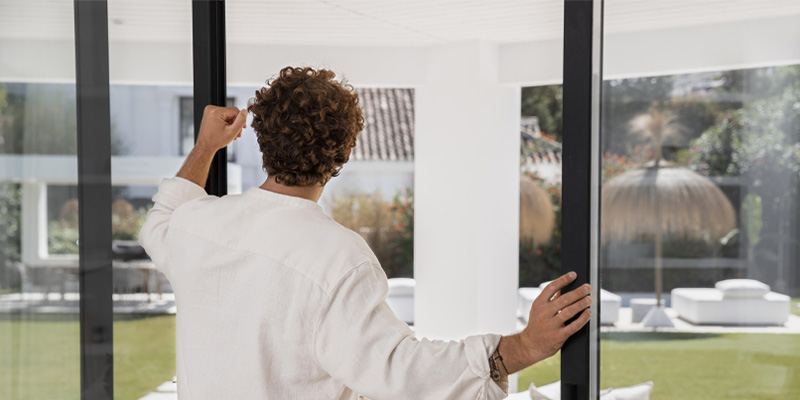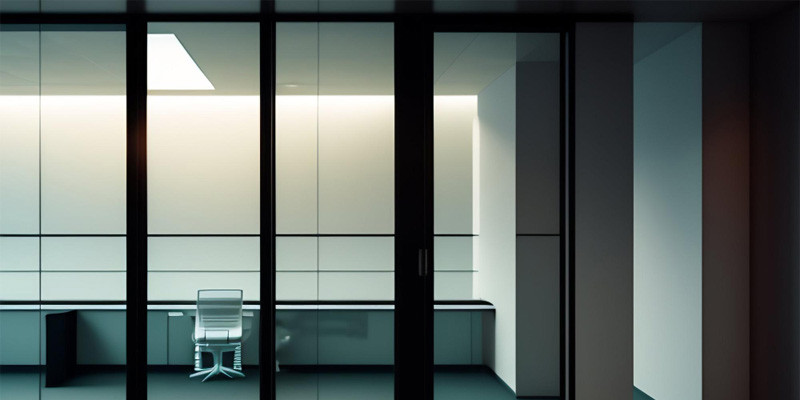When it comes to enhancing the energy efficiency and comfort of our homes or offices, two popular options that often come to mind are smart glass and double glazing. Both these technologies have their unique features and advantages, but which one is truly better? Let’s delve into the details of smart glass vs double glazing to help you make an informed decision.
Differences Between Smart Glass And Double Glazing
Here you can check the differences between smart glass and double glazing:
Definition and Functionality
What is Smart Glass?
Smart glass, also known as switchable glass or privacy glass, is a cutting-edge technology that allows the glass to change its transparency at the push of a button or through automated sensors. It uses innovative electrochromic, thermochromic, or suspended particle device (SPD) technologies to alter its light transmission properties. This dynamic glass provides privacy, glare reduction, and solar heat control while allowing natural light to enter the space.
What is Double Glazing?
Double glazing, on the other hand, refers to the use of two glass panes separated by a layer of air or gas to create an insulated barrier. This design significantly improves thermal insulation and reduces heat transfer between the interior and exterior of a building. Double glazing is known for its ability to enhance energy efficiency, reduce noise, and provide better insulation compared to traditional single-pane windows.
Advantages: Smart Glass vs Double Glazing

Ultimate Benefits of Smart Glass
- Privacy: It offers instant privacy by transforming from transparent to opaque, making it ideal for various settings.
- Energy Efficiency: It controls the amount of heat and light entering a space, reducing the need for artificial lighting and air conditioning.
- UV Protection: It blocks harmful UV rays, protecting furniture, artwork, and occupants from sun damage.
- Aesthetics: It adds a modern and sleek touch to any space, seamlessly integrating with the surrounding decor.
- Noise Reduction: It provides sound insulation, creating a quieter and more comfortable environment.
- Versatility: It can be used in windows, partitions, doors, and skylights, offering flexibility in design and functionality.
- Glare Reduction: It minimizes glare from sunlight, ensuring a more comfortable visual experience.
- Privacy without Sacrificing Natural Light: It allows for privacy while still allowing natural light to enter the space.
- Customizable: It can be customized in terms of size, shape, and tint to fit specific requirements and design preferences.
- Increased Property Value: It adds a unique and high-tech feature to a property, potentially increasing its value.
Ultimate Benefits of Double Glazing
- Energy Efficiency: It improves thermal insulation, reducing heat transfer between the interior and exterior of a building.
- Noise Reduction: It provides enhanced soundproofing, creating a quieter indoor environment
- Security Enhancement: It adds an additional layer of protection, making it more difficult for intruders to break through windows.
- Condensation Prevention: It reduces condensation buildup on the interior surface of windows, minimizing the risk of mold and mildew growth.
- Durability: It offers increased strength and resilience compared to single-pane windows.
- Increased Comfort: It helps maintain a more stable indoor temperature, enhancing overall comfort.
- UV Protection: It blocks a significant portion of harmful UV rays, protecting occupants and interior furnishings.
- Customization Options: It is available in various designs, styles, and frame materials, allowing for personalized choices.
- Long-Term Cost Savings: It can lead to energy savings over time, potentially reducing heating and cooling expenses.
- Property Value Enhancement: It adds value to a property due to its energy-efficient and soundproofing qualities.
Disadvantages: Smart Glass vs Double Glazing
Drawbacks of Smart Glass

- Cost: It is generally more expensive than traditional glass options, which can be a significant factor for budget-conscious individuals.
- Power Requirements: It requires an electrical connection to function, adding complexity during installation and maintenance.
- Installation Limitations: It may require professional installation due to its specialized technology and electrical components.
- Limited Availability: It may not be as readily available as traditional glass, making it more challenging to source and install.
- Potential Maintenance Needs: Electrical components and control systems may require occasional checks or servicing, adding to the overall maintenance requirements.
- Glazing Thickness: The thickness of the glass may limit design options, especially in retrofit projects with existing window frames.
Drawbacks of Double Glazing

- Upfront Cost: It can be more expensive to install compared to single-pane windows.
- Limited Design Flexibility: The thickness may limit certain design options, especially in older buildings or specific architectural styles.
- Weight: It is generally heavier than single-pane windows, requiring adequate structural support during installation.
- Installation Complexity: Professional installation may be required to ensure proper fitting and sealing.
- Repair and Replacement Costs: If one pane gets damaged, the entire unit may need replacement, which can be costly.
- Reduced Ventilation: It limits the ability to open windows, affecting natural ventilation fully.
- Maintenance Requirements: It may require periodic cleaning and maintenance to ensure optimal performance.
- Retrofitting Challenges: Retrofitting the glass in existing buildings can be more challenging and may require additional modifications.
- Limited Availability of Retrofit Options: It may be more difficult to find suitable retrofit options for specific window sizes and configurations.
- Heat Retention: In warmer climates, double glazing may retain heat indoors, requiring additional cooling measures.
Which is Better To Choose?
The choice between smart glass or double glazing depends on various factors such as budget, energy efficiency requirements, privacy needs, and aesthetic preferences. If you are looking for dynamic control over light and heat, privacy on demand, and integration with smart home systems, smart glass is the ideal choice. On the other hand, if you prioritize cost-effectiveness, superior sound insulation, and overall energy efficiency, double glazing is the better option.
Conclusion
Both smart glass and double glazing offer significant benefits when it comes to energy efficiency, comfort, and aesthetics. Understanding the differences and considering your specific needs will help you make an informed decision. Whether you choose smart glass or double glazing, both options are excellent choices for enhancing the performance and functionality of your windows and creating a more sustainable living or working environment.
Yes, It can indeed be used for external windows. It offers privacy and glare reduction while still allowing natural light to enter, making it suitable for a variety of applications.
While it can be installed in older buildings, it may require some modifications to accommodate the additional thickness. Consulting with a professional can help ensure a proper installation.
It generally requires minimal maintenance. However, it's important to conduct occasional checks or servicing on the electrical connections and control systems to ensure their proper functioning.
Yes, it is known for its ability to improve insulation. By reducing heat transfer, it can help lower heating and cooling costs in a building, contributing to energy efficiency.
DIY installation is possible for double glazing. It is recommended to seek professional expertise for smart glass installations. The electrical connections and control systems involved in smart glass installations typically require specialized knowledge and skills.





